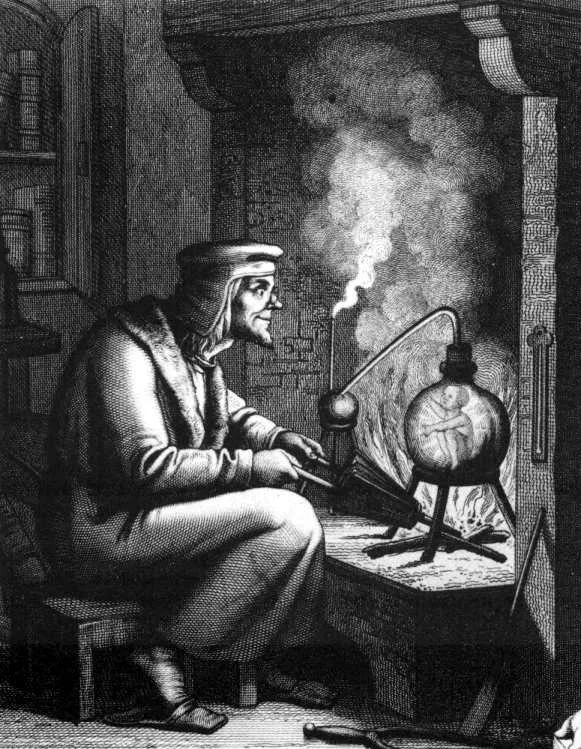Llewellyn King: Making movies with the dead as AI hammers the truth AND improves (at least physical) health
Depiction of a homunculus from Wolfgang von Goethe's (1749-1832) Faust in a 19th Century engraving.
Popularized in 16th-Century alchemy and 19th Century fiction, it has historically referred to the creation of a miniature fully formed human.
WEST WARWICK, R.I.
Advanced countries can expect a huge boost in productivity from artificial intelligence. In my view, it will set the stage for a new period of prosperity in the developed world — especially in the United States.
Medicine will take off as never before. Life expectancy will rise by a third.
The obverse may be that jobs will be severely affected by AI, especially in the service industries, ushering in a time of huge labor adjustment.
The danger is that we will take it as the next step in automation. It won’t. Automation increased productivity. But, creating new goods dictates new labor needs.
So far, it appears that with AI, more goods will be made by fewer people, telephones answered by ghosts and orders taken by unseen digits.
Another serious downside will be the effect on truth, knowledge and information; on what we know and what we think we know.
In the early years of the wide availability of artificial intelligence, truth will be struggling against a sea of disinformation, propaganda and lies — lies buttressed with believable fake evidence.
As Stuart Russell, a professor of computer science at the University of California at Berkeley, told me when I interviewed him on the television program White House Chronicle, the danger is with “language in, language out.”
That succinctly sums up the threat to our well-being and stability posed by the ability to use AI to create information chaos.
At present, two ugly wars are raging and, as is the way with wars, both sides are claiming huge excesses from the other. No doubt there is truth to both claims.
But what happens when you add the ability of AI to produce fake evidence, say, huge piles of bodies that never existed? Or of children under torture?
AI, I am assured, can produce a believable image of Winston Churchill secretly meeting with Hitler, laughing together.
Establishing veracity is the central purpose of criminal justice. But with AI, a concocted video of a suspect committing a crime can be created or a home movie of a suspect far away on a beach when, in fact, the perpetrator was elsewhere, choking a victim to death.
Divorce is going to be a big arena for AI dishonesty. It is quite easy to make a film of a spouse in an adulterous situation when that never happened.
Intellectual property is about to find itself under the wheels of the AI bus. How do you trace its filching? Where do you seek redress?
Is there any safe place for creative people? How about a highly readable novel with Stephen King’s characters and a new plot? Where would King find justice? How would the reader know he or she was reading a counterfeit work?
Within a few months or years or right now, a new movie could be made featuring Marilyn Monroe and, say, George Clooney.
Taylor Swift is the hottest ticket of the time, maybe all time, but AI crooks could use her innumerable public images and voice to issue a new video or album in which she took no part and doesn’t know exists.
Here is the question: If you think it is an AI-created work, should you enjoy it? I am fond of Judy Garland singing “The Man That Got Away.” What if I find on the Internet what purports to be Taylor Swift singing it? I know it is a forgery by AI, but I love that rendering. Should I enjoy it, and if I do, will I be party to a crime? Will I be an enabler of criminal conduct?
AI will facilitate plagiarism on an industrial scale, pervasive and uncontrollable. You might, in a few short years, be enjoying a new movie starring Ingrid Bergman and Humphrey Bogart. The AI technology is there to make such a movie and it might be as enjoyable as Casablanca. But it will be faked, deeply faked.
Already, truth in politics is fragile, if not broken. A plethora of commentators spews out half-truths and lies that distort the political debate and take in the gullible or just those who want to believe.
If you want to believe something, AI will oblige, whether it is about a candidate or a divinity. You can already dial up Jesus and speak to an AI-generated voice purporting to be him.
Overall, AI will be of incalculable benefit to humans. While it will stimulate dreaming as never before, it will also trigger nightmares.
On Twitter: @llewellynking2
Llewellyn King is executive producer and host of White House Chronicle, on PBS. He’s based in Rhode Island and Washington, D.C.
